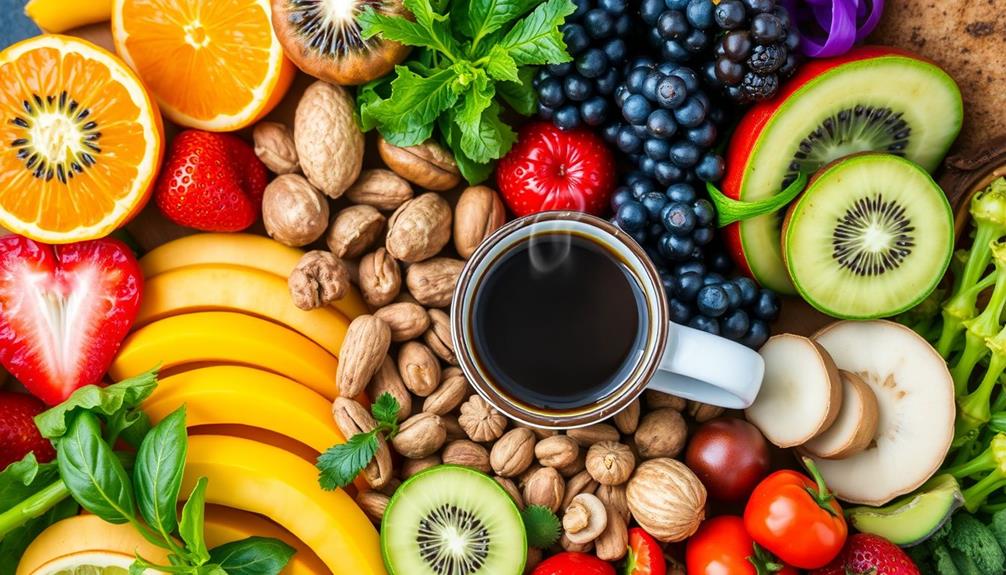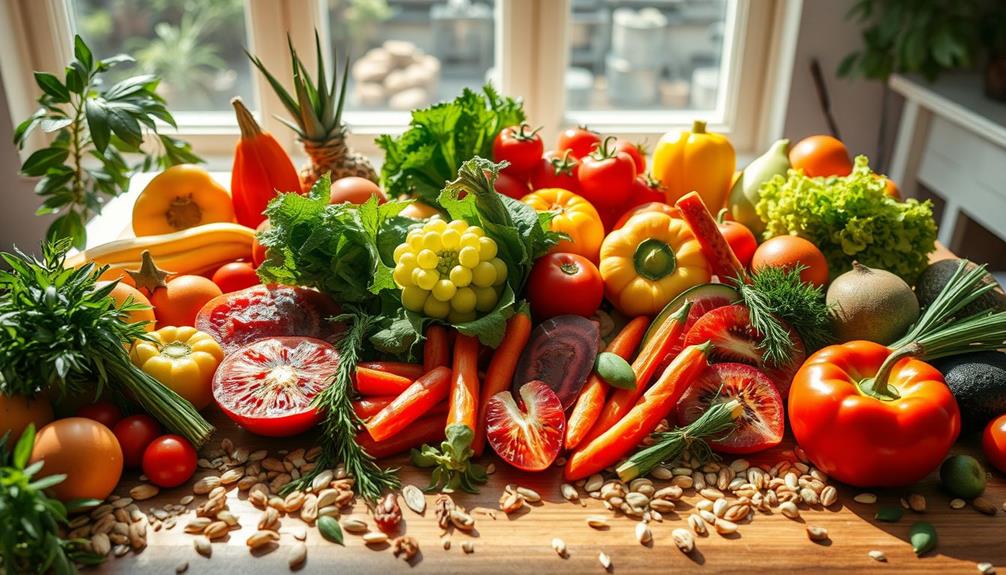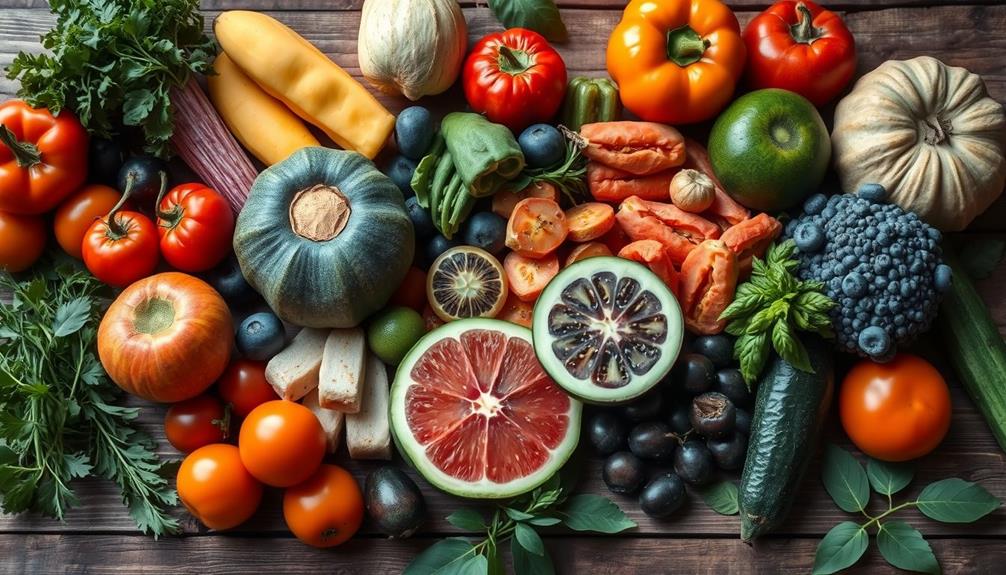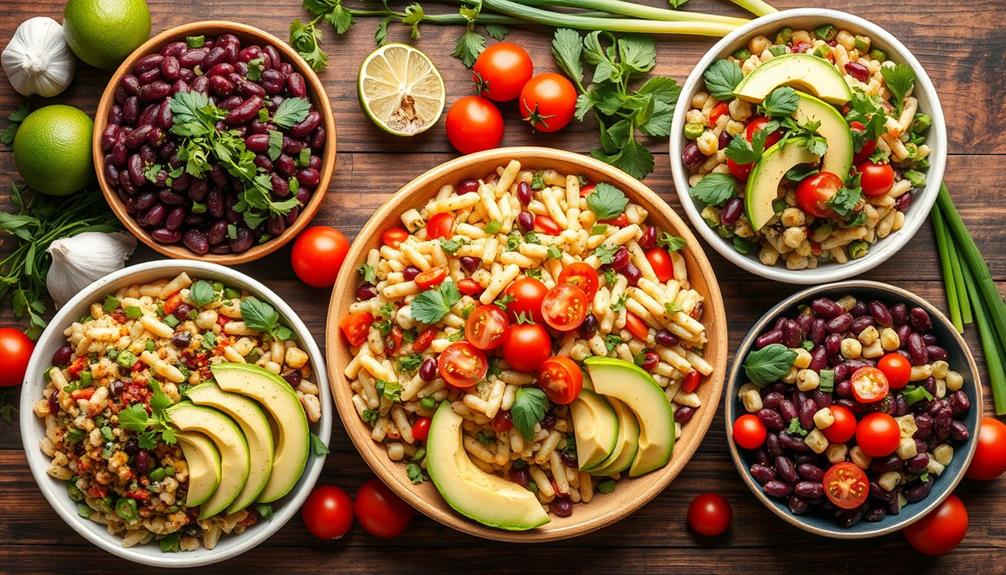You can't really drink coffee on a raw food diet. Coffee's processing and heating methods don't align with the diet's emphasis on unprocessed foods at low temperatures. Plus, its high acidity might cause digestive issues. While some people might enjoy coffee occasionally, it could counteract the health benefits that come from a raw diet. Instead, you might want to try alternatives like herbal teas or green smoothies that fit better with your goals. If you're curious about more options and tips for a successful raw food journey, there's plenty more to explore.
Key Takeaways
- Coffee is generally excluded from a raw food diet due to processing and heating beyond the acceptable temperature range.
- The high acidity of coffee may cause digestive issues for some individuals following a raw food lifestyle.
- Caffeine can lead to dehydration and may counteract the health benefits of a raw food diet.
- Herbal teas, raw smoothies, and nut milk are recommended alternatives that align with raw food principles.
- Engaging with raw food communities can provide support and resources for managing coffee cravings.
Overview of Raw Food Diet
If you're considering a raw food diet, it's essential to understand its core principles. This diet emphasizes consuming unprocessed foods, focusing primarily on raw fruits, vegetables, nuts, seeds, and sprouted grains. By keeping food temperatures below 104-118°F (40-48°C), you preserve important nutrients and enzymes.
Additionally, incorporating high-antioxidant foods like beetroot can enhance your nutrient intake. You can enjoy various meal preparation methods, including juicing, blending, dehydrating, soaking, and sprouting. Some variations even allow raw animal products, such as eggs, dairy, fish, or meat.
The raw food diet is often praised for its potential health benefits, including increased energy, weight loss, improved digestion, and a reduced risk of chronic diseases due to its high intake of fresh produce.
However, achieving nutritional balance can be challenging. If you don't plan carefully, you might face deficiencies in essential nutrients like protein, vitamin B12, iron, and calcium.
Adhering to this diet requires significant commitment and meal preparation, which can be socially and logistically challenging.
Coffee and Raw Food Principles

Traversing the world of coffee while adhering to a raw food diet can be tricky. Coffee is typically excluded from this lifestyle because it's processed and heated during preparation, which violates the raw food principles that emphasize uncooked and unprocessed foods.
Even decaffeinated coffee isn't regarded as raw, as the decaffeination process involves chemical extraction, contradicting the ethos of raw food. Additionally, understanding the brewing methods can highlight how different techniques affect the health aspects of beverages.
If you're focused on digestive health, you might want to reflect on the high acidity of coffee, which can lead to digestive issues for some. Although some raw food enthusiasts may indulge in coffee occasionally for enjoyment, it's generally discouraged, as it can counteract the cleansing effects of the raw food lifestyle.
Instead of coffee, you might explore alternatives like herbal teas or raw smoothies. These options not only align with the raw food principles but also provide delicious flavors without the drawbacks of caffeine.
Effects of Caffeine on Health

Caffeine, a stimulant found in coffee and various other beverages, can have significant effects on your health. When you consume caffeine, it rapidly enters your bloodstream, triggering your body's fight-or-flight response. This can elevate your heart rate and blood pressure, which may not be ideal for everyone.
Additionally, consider the potential interactions of caffeine with other substances, as it can affect hydration levels and nutrient absorption, making it important to select the right cold medication if needed.
Here are a few key effects of caffeine you should consider:
- Mineral Loss: Regular caffeine consumption can lead to the loss of essential minerals like calcium and magnesium, as these are excreted through urine.
- Dehydration: Caffeine's diuretic properties can contribute to dehydration, which might impact your overall well-being.
- Digestive Discomfort: Caffeine can reduce circulation to your digestive system, leading to potential digestive discomfort.
- Addictive Nature: The addictive nature of caffeine may cause withdrawal symptoms, such as headaches and mood disturbances if you suddenly cut back.
Being mindful of these effects can help you make informed choices about your coffee consumption, particularly on a raw food diet.
Balancing your caffeine intake with hydration and mineral-rich foods can support your health goals effectively.
Caffeine Dependency and Withdrawal

Caffeine can create a physical dependence, making it hard to go without its stimulating effects.
As you navigate this dependency, consider how alternatives like essential oils, such as peppermint oil for its invigorating scent, can help alleviate feelings of fatigue.
If you decide to cut back, you might experience withdrawal symptoms like headaches, fatigue, and irritability, but these usually pass quickly.
In the long run, quitting caffeine can lead to improved sleep and reduced anxiety, enhancing your overall well-being.
Physical Dependence on Caffeine
For many regular coffee drinkers, the morning ritual of brewing a cup can quickly morph into a reliance on caffeine that's hard to shake. This physical dependence on caffeine can lead to a cycle where your body craves more to achieve the same stimulating effects.
Individuals with emotional dysregulation, such as those experiencing symptoms of Borderline Personality Disorder, may find that caffeine exacerbates their mood swings. Breaking free from this dependency can be challenging, but it's possible, especially when considering a raw food diet.
Here are four key points to keep in mind:
- Withdrawal Symptoms: Reducing caffeine can trigger temporary headaches, fatigue, irritability, and even depression, especially within the first few days.
- Natural Energy Sources: Shifting to a raw food diet provides unprocessed foods that offer sustained energy, helping you move away from caffeine reliance.
- Improved Sleep Quality: Quitting caffeine often leads to better sleep, allowing your body to recharge more effectively.
- Reduced Anxiety: Many find that eliminating caffeine results in lower anxiety levels, contributing to overall mental well-being.
While the initial discomfort of withdrawal symptoms can be tough, the long-term benefits of reduced dependence on caffeine can be well worth the effort.
Withdrawal Symptoms Experienced
Experiencing withdrawal symptoms when you cut out caffeine can be quite challenging. As caffeine acts as a psychoactive drug, many people develop a physical dependence, making the shift to a caffeine-free lifestyle tough.
When you stop consuming caffeine, you might encounter withdrawal symptoms like headaches, fatigue, irritability, and even feelings of depression. These symptoms can last anywhere from several days to weeks, depending on how much caffeine you consumed and for how long. Understanding the importance of a budget to manage expenses during this period can also help ease the financial stress that may accompany lifestyle changes.
The discomfort during detoxification can be significant, but remember that it's often temporary. Many individuals find that after this initial period, their energy levels and overall well-being improve.
To ease the shift, consider gradually reducing your caffeine intake instead of quitting abruptly. This method can help mitigate the severity of withdrawal symptoms and make the process more manageable.
While the first few days may be rough, staying committed to a caffeine-free lifestyle can lead to long-term benefits that outweigh the temporary discomfort.
Embrace the journey, and soon you'll likely enjoy better energy levels and a clearer mind without relying on caffeine.
Long-term Health Benefits
Shifting away from caffeine can reveal a range of long-term health benefits that enhance your overall well-being. By embracing a raw food diet, you can tap into natural energy sources derived from fruits and vegetables, which reduces your dependence on stimulants.
This change, much like the power of imagination, allows for profound personal transformation and promotes a healthier lifestyle. Here are some of the key long-term health benefits you might experience:
- Better sleep quality: Eliminating caffeine can lead to deeper, more restorative sleep, allowing your body to recover and rejuvenate effectively.
- Reduced anxiety levels: Without caffeine's stimulating effects, you may notice a significant drop in anxiety, leading to a calmer, more balanced state of mind.
- Increased energy: You'll find that the energy you gain from fresh fruits and vegetables is more sustainable than the quick highs from caffeine, without the subsequent crashes.
- Improved overall well-being: Your body can function more efficiently, allowing you to feel healthier and more vibrant in your daily life.
While the initial change might be challenging due to withdrawal symptoms, the long-term health benefits of eliminating caffeine can profoundly enhance your quality of life.
Alternatives to Coffee
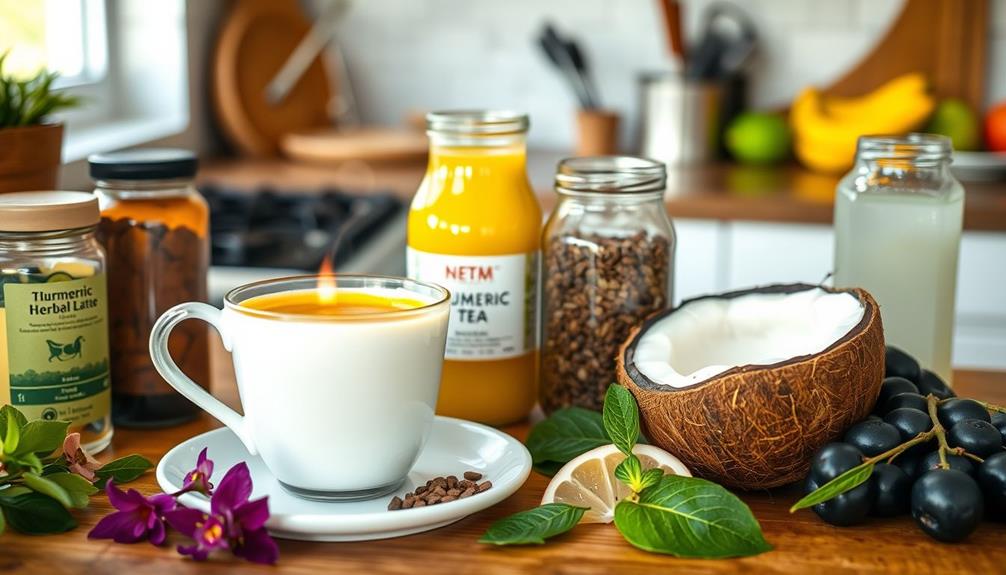
Exploring alternatives to coffee can enhance your experience on a raw food diet without sacrificing enjoyment. Here are some great options to evaluate:
| Alternative | Description | Benefits |
|---|---|---|
| Herbal Teas | Chamomile or peppermint, caffeine-free. | Relaxing and soothing |
| Hot Water with Lemon | Warm water mixed with lemon and raw honey. | Aids digestion, invigorating drink |
| Raw Nut Milk | Blended nuts and water, creamy texture. | Satisfying substitute for coffee |
| Green Smoothies | Leafy greens blended with fruits. | Nutrient-dense, energizing option |
| Coconut Water | Natural electrolyte-rich beverage. | Hydrating and energizing |
These alternatives to coffee not only fit within the raw food diet but also provide you with enjoyable flavors and health benefits. Herbal teas can be a perfect evening beverage, while hot water with lemon offers a tangy kick to start your day. Raw nut milk can elevate your smoothies, and green smoothies keep you energized throughout. Finally, coconut water provides essential hydration. With these options, you can easily maintain a caffeine-free lifestyle while still enjoying delicious drinks.
Impact of Caffeine on Digestion

While enjoying various alternatives to coffee can enhance your raw food diet, it's important to contemplate how caffeine itself might affect your digestive health. Caffeine can lead to several digestive issues that you should consider: It can also exacerbate stress levels, which is essential for maintaining a balanced diet and overall health stress management techniques.
- Decreased Circulation: Caffeine consumption can reduce blood flow to your digestive system, which may result in discomfort and digestive issues.
- Increased Heart Rate: It triggers your fight-or-flight response, raising your heart rate and blood pressure, which often disrupts digestion.
- Dehydration: Caffeine acts as a diuretic, pulling water from your digestive tract and potentially hindering digestion due to dehydration.
- Nutrient Absorption: Regular caffeine intake might contribute to mineral loss, such as calcium and magnesium, through urine, which can negatively impact nutrient absorption and overall digestive health.
These factors combined can mask feelings of fatigue with artificial energy bursts, leading you to overlook the rest your body might need.
If you're aiming for ideal digestion on a raw food diet, it might be wise to limit your caffeine intake and focus on hydration and nutrient-rich alternatives.
Nutritional Balance in Raw Diet
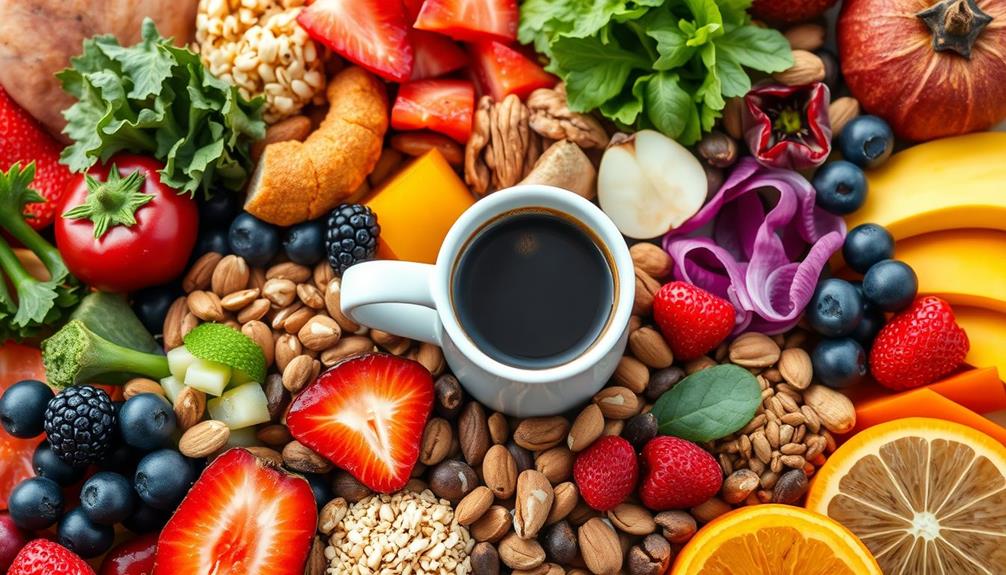
Maintaining nutritional balance on a raw food diet can be challenging, especially since you're excluding many cooked foods that enhance nutrient absorption. A raw food diet primarily consists of unprocessed fruits, vegetables, nuts, seeds, and sprouted grains. While this diet can lead to high fiber intake, it often falls short in essential nutrients, particularly protein and vitamin B12.
To achieve nutritional balance, careful meal planning is vital. Incorporating a wide variety of food groups helps mitigate the risk of deficiencies. Here's a quick reference table to guide your choices:
| Food Group | Sources | Essential Nutrients |
|---|---|---|
| Fruits | Apples, Bananas | Vitamins A & C |
| Vegetables | Spinach, Carrots | Iron, Calcium |
| Nuts & Seeds | Almonds, Chia Seeds | Omega-3, Protein |
Long-term Health Considerations

Long-term adherence to a raw food diet raises important health factors, especially regarding caffeine consumption. While coffee might seem like a harmless addition, it can lead to several potential health issues that could counteract the benefits of your diet.
Incorporating gentle stretching before bedtime can also help alleviate tension and improve overall well-being, complementing the focus on nutrient density in a raw food diet.
Here are four key points to reflect upon:
- Hydration Benefits: Regular coffee consumption can cause dehydration, undermining the hydration benefits of a raw food diet filled with fruits and vegetables.
- Energy Levels: Relying on caffeine can mask underlying fatigue, leading to energy crashes and nutrient deficiencies. By eliminating caffeine, you may find your natural energy levels improve considerably.
- Potential Health Issues: Long-term caffeine use is linked to increased anxiety, digestive problems, and adverse effects on adrenal health, which can compromise your overall health.
- Caffeine-free Lifestyle: Committing to a caffeine-free lifestyle aligns well with the goals of a raw food diet, focusing on nutrient density and holistic health.
Personal Experiences With Coffee

Exploring personal experiences with coffee can reveal a spectrum of feelings among raw food enthusiasts. Many of you might find yourself caught between enjoying the rich coffee culture and being mindful of its health impacts, particularly regarding acidity and adrenal health.
In the Rawtarian Community, over 5,000 members share their personal experiences, showcasing how coffee can both enhance and challenge one's raw food journey. Some members have noted how certain foods, like safe snacks for hamsters, can also play a role in overall health, highlighting the importance of mindful consumption.
Some individuals have reported significant improvements in well-being and energy levels after eliminating coffee entirely, illustrating that caffeine affects everyone differently. Yet, if you want to maintain your coffee habits while adhering to raw principles, organic and freeze-dried coffee can be viable options.
Additionally, experimentation with coffee substitutes can help satisfy your cravings. Blending raw ingredients like coconut or cocoa can create delicious alternatives that mimic coffee flavors without compromising your raw food diet.
Ultimately, your personal experiences with coffee will shape your choices, whether you lean toward moderation, seek substitutes, or decide to eliminate it altogether. What's important is finding what works best for your health and lifestyle.
Making Informed Choices

Maneuvering coffee consumption on a raw food diet requires careful consideration of your health and preferences. While some raw food enthusiasts choose to indulge in organic or decaffeinated coffee, it's crucial to weigh the potential impacts on your body.
Here are four key factors to keep in mind:
- Digestive Issues: Coffee's high acidity might lead to digestive problems for some, affecting your overall health on a raw food diet.
- Dehydration: Caffeine can strain your adrenal glands and contribute to dehydration, countering the hydrating benefits of raw foods.
- Alternatives: Consider herbal teas or blended drinks using raw ingredients; these can provide satisfying flavors without the drawbacks of caffeine.
- Community Support: Engaging with the raw food community can offer valuable insights and support as you navigate your coffee options while sticking to your lifestyle.
Ultimately, making informed choices about coffee involves balancing your cravings with your health needs.
Listen to your body, explore alternatives, and stay connected with the community to find what works best for you.
Frequently Asked Questions
Can You Drink Coffee on a Gut Cleanse?
During a gut cleanse, you shouldn't drink coffee. It can irritate your digestive tract, dehydrate you, and increase stress on your body. Instead, try caffeine-free herbal teas for a soothing, beneficial alternative.
What Can You Not Eat on a Raw Food Diet?
What foods should you avoid on a raw food diet? You can't eat cooked animal proteins, certain raw beans, processed sweeteners, or any refined foods. Stick to fresh, unprocessed, and natural options for ideal health.
Can You Have Tea on a Raw Diet?
You can have tea on a raw diet if you choose herbal varieties made from raw ingredients. Just make sure to steep them in water below 118°F to maintain the raw food principles you follow.
What Are the Disadvantages of Eating Raw Food?
Did you know 43% of raw food dieters face nutritional deficiencies? Eating raw can lead to digestive issues, increase foodborne illness risk, limit social options, and require extensive meal prep, making it quite challenging.
Conclusion
As you navigate the vibrant landscape of a raw food diet, picture the sun-kissed fruits and crisp veggies that fuel your body. While sipping that steaming cup of coffee might tempt you, consider the delicate balance of energy and wellness it brings. Embrace alternatives that invigorate, like herbal teas or fresh juices, and listen to your body's whispers. Ultimately, it's about crafting a nourishing journey that leaves you feeling light, energized, and connected to your health.

